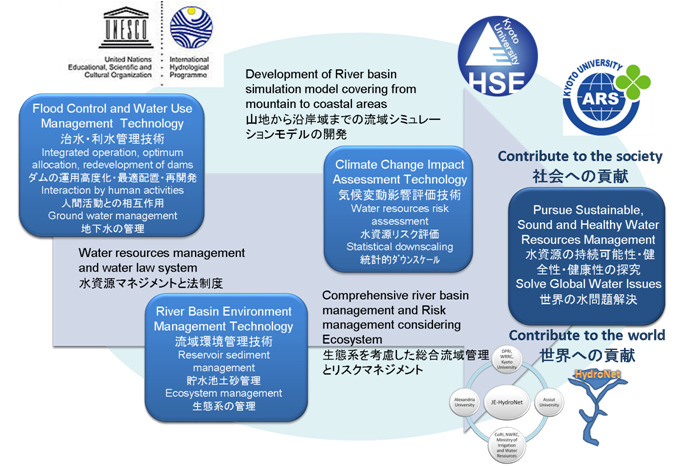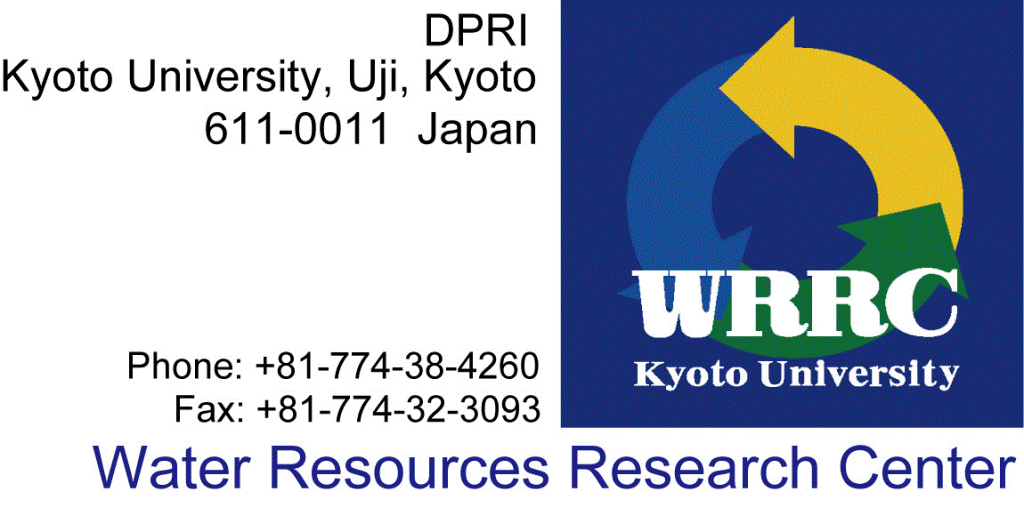Water Resources Research Center...
The Water Resources Research Center was established in 1978 aiming to understand the natural and social phenomena associated with water resources issues. The Center investigates the complete water resources management system, including conservation and development of water resources as integrated elements of geosystems, social systems and ecosystems. Physically-based water cycles and related substances are scientifically and quantitatively modeled from regional to global scales from the viewpoint of hydrometeorology, and systematic approaches for environmental assessment of water resources are proposed to link atmospheric conditions with surface, subsurface and ground water zones. In addition, social and ecological risk management of water resources is proposed based on the needs of human activities and impacts of regional development and climate change as well as large scale disasters such as the Great East Japan Earthquake on the socio- and eco-environments. We pursue sustainable, sound and healthy water resources management and contribute for global water issues such as in Nile River, Aral Sea and Red River (Vietnam) basins. The center is biennially hosting UNESCO-IHP training course and also contributing to Kyoto University GCOE-ARS and GCOE-HSE programs.

- Global Water Dynamics
The research is focused on the analyses of interaction among global water dynamics and human activities seeking solutions for water resources problems. The current research topics are development of global water dynamics model including social and economic activities, and downscaling of global hydrologic information for estimation of temporal and spatial distribution of water resources. Additionally, in order to develop prevention and mitigation system of water-related hazards, which will be worsening as a result of global change, regional preparedness and human response to floods and droughts are also investigated.
- Regional Water Environment System
The "integrated water resources management model" which consists of a distributed hydrological model, a land surface process model, a groundwater model, a water quality model, a sediment transport model, a food chain model, a crop growth model, a reservoir operation model, a socioeconomic model, etc. is being developed. This model is an integrated model which describes not only a natural hydrological system but also artificial systems such as a regulation of a flood and a release from a reservoir to satisfy the demand from each sector. This model is expected to be applied to various kind of topics, such as diagnosis of the reliability of the current water resources system, decision support for water resources planning, evaluation of the flood risk, drought risk, ecosystem risk under a future climate change, and proposal of a risk reduction and an adaptation measure to the anticipated impact from climate change, assessment of a movement of radioactive materials in a watershed .
- Socio and Eco Environment Risk Management
In order to solve long term environmental problems in the water resources issues, influences of geo-, eco- and socio-system changes on water resources systems are analyzed from the aspect of risk management. Measures for integrated river basin management of flood control, water use and environmental conservation are investigated to enjoy sustainable ecosystem services. We focus on subjects such as
1)asset management of dams and development of reservoir sediment management methods
2)model development of eco-sediment hydraulics by habitat structure analysis
3)interactions between human use and ecosystem responses in water front environments
- Hydrologic Environment System
Hydrologic Environment System (Funded by Japan Weather Association) aims to clarify the mechanisms of environmental issues and disasters associate with hydrologic cycle from head water to the ocean considering that how we can adapt the climate and social changes. We focus on the following topics;
1) Development of application method of hydro-meteorological observed or predicted information to water resources management, hydro-environmental management and countermeasures to water-related disasters.
2) Analysis of the impact of climate change or social dynamics on water environment, industries such as agriculture, forestry and fishery, energy environment, and health, medical and sanitary environment in urban and local living areas to investigate the new scenario for hydro-environmental disaster based on these effects.
3) Development of downscaling method of prediction models on climate change or social dynamics for the utilization in impact assessments on urban and local living area, and development of database for the impact assessment.
- Water Resources Distribution Assessment (Visiting Professors)
Extramural researchers are invited to this research field in order to provide knowledge and techniques for analysis of water, heat, material cycle, evaluation, planning, and management of water resources systems for the human society co-existing with nature. The current researches are focused on prediction of basin environmental changes under climate change and their impacts on ecosystem services. In particular, the researches on the following topics are going on;
1) Estimation and prediction on basin ecosystem changes such as biodiversity under climate change using habitat suitability indices estimated by combining the distributed rainfall runoff model and remote sensing of riparian landscapes.
2) Quantitative evaluation of ecosystem services and provision of their changes in future based on environmental and economic scenario analysis in gsatoyamah and scheme proposal for suitable utilization system of the biomass resources in the area.
|


